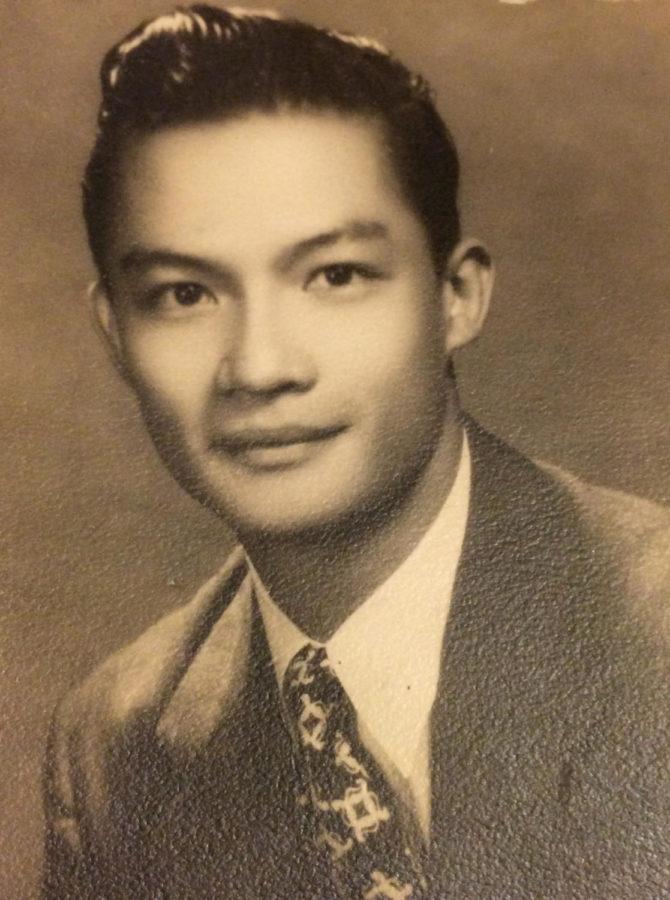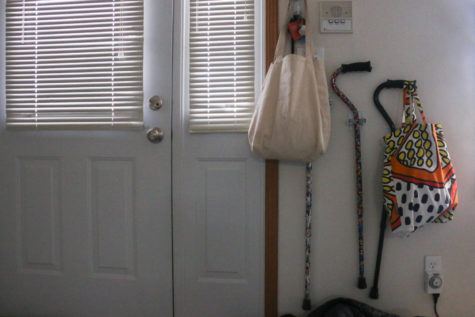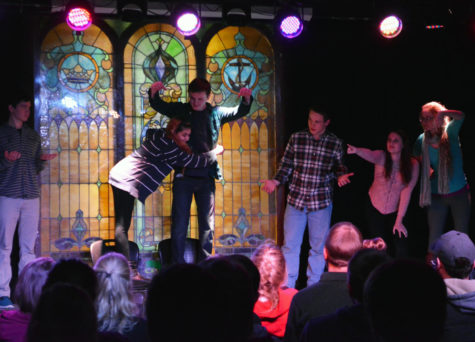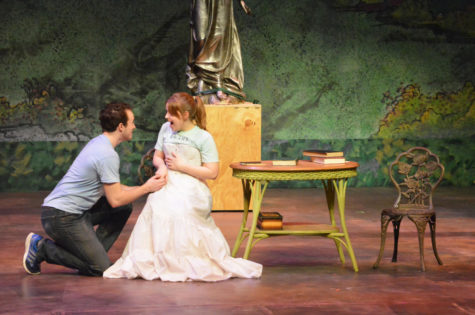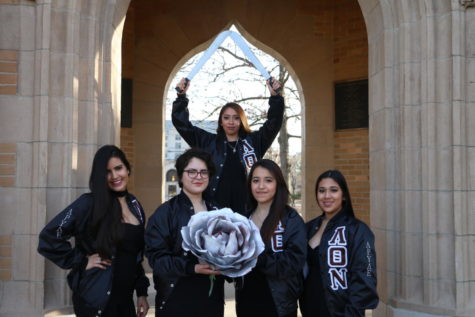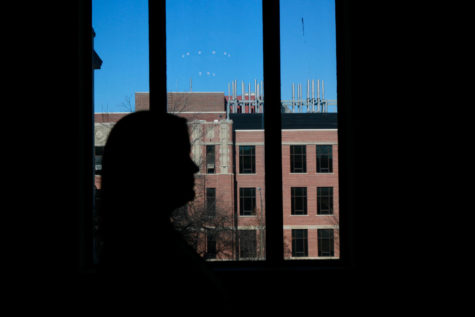Three generations of finding acceptance at Iowa State
May 1, 2019
In 1950, Homer Minjen Chen had a decision to make. Going back to his native country of China was not an option, however, attending college in the United States was.
All Chen did next was randomly select the middle portion of the United States.
Homer Chen was born in 1928 in Beijing, the capital of China. The oldest of five children, he and his siblings grew up in Guilin, the southern city known for the distinct landscape of limestone hills. His father served as a diplomat in Panama for the Chinese National Government under Chiang Kai Shek.
According to Tao Wang, assistant professor in history in Iowa State, Kai Shek came to leadership in 1920 with the intention of combining traditional Chinese and Western values. Wang said Kai Shek was referred as the father of modern China and the country itself looked to Japan as a model for successful modernization. Kai Shek’s views faced opposition from the growing Communist Party, which lead to war in 1927.
Along with those that opposed communism, Japan, under militarism control, invaded China in 1937, setting up occupation in the northeast part of the country.
Chen and his family, living in the southern part of the country, were unaffected until 1944, when the Japanese occupation spread to the southern coastal cities.
As the Japanese came closer to Guilin, Homer Chen and his brother knew they had to leave. Chen’s daughter, Melinda Chen, recalled he told her they could hear the Japanese coming from the top of the hills.
Homer Chen and his brother departed the country and escaped to Panama to reunite with their father.
Once in Panama, Homer Chen stayed in the Panama Canal and had to learn Spanish as he finished his secondary education.
After completing his education in Panama, Homer wanted to return to China. When he learned that his mother and other brother were thrown into concentration camps in China due to their status, he knew it wasn’t an option.
Homer Chen decided to look into the United States for his college degree.
“He thought the middle of the country was good for him,” Melinda Chen said.
Katrina Choong, senior in electrical engineering and Homer Chen’s granddaughter, said her grandfather thought he would not have any distractions in the Midwest.
Homer Chen began applying to schools in August 1950. Iowa State ended up being the first school to grant him admission.
When it came to academics, he was unsure of what area he should study. Eventually someone suggested civil engineering.
For Homer Chen, the biggest challenge for him during his time at Iowa State was the language barrier. He was fluent in Mandarin, Cantonese and Spanish, but couldn’t speak much English and was learning the language simultaneously with his studies at the university.
He would find an universal language with his peers through mathematics.
While there were not many other Chinese students on campus in the early 1950s, Homer Chen said the people on campus were nice to him. Students would invite him home during breaks and taught him the traditions of American holidays.
“People were fascinated because he looked different, [and had] with [him] different customs,” Melinda Chen said. “He felt very welcomed.”
Homer Chen graduated in 1953 from Iowa State with his bachelor’s degree in civil engineering. He was prepared to begin his time in the workforce working for the Illinois Department of Transportation in Springfield, Illinois.
He just needed to get to Springfield.
Homer Chen said he approached then-Iowa State president Charles Friley for financial assistance. The assistance was granted and Friley gave him $100 on the promise that Homer Chen would pay him back with his paycheck.
And he did just that.
Homer Chen enjoyed his stay in the state capital, but found company in the form of a pen pal thousands of miles away in the small country of Costa Rica. America Sanchez and her family had left China for business ventures in Costa Rica. They even changed their last name to Sanchez to reflect the new country they embraced as home.
Sanchez started off as Homer Chen’s pen pal, but after meeting with him in Chicago along with her mother and brother, proposed marriage, and the two were married as the end of their visit approached.
The two moved to Rockville, Maryland in 1955 and welcomed three children: Melinda, Jose and Eduardo Chen.
For Melinda Chen, she was aware of her father’s alma mater from a young age. She remembered her father constantly wearing his red and gold college ring.
“My brother and I would play with [his ring],” Melinda Chen said.
Her father’s ring reminded her of another frequent ring-wearer she had seen: the cartoon character, Hercules. The character had a ring that he would wear to generate his strength.
She declared to her father that just like him, she too would attend Iowa State.
“He didn’t want me to go so far away from home,” Melinda Chen said.
Melinda Chen initially turned down her spot at Iowa State and intended to attend Duke University in North Carolina, which was still five hours away from her home.
Melinda Chen ended up having second thoughts about her decision and decided her dad’s desires for her to be close shouldn’t be the center point in her college decision.
“I ended up asking Iowa State if I could still attend,” Melinda Chen said, decommitting from Duke. “[Iowa State] didn’t have any dorm space, so I got put in this large space [in one of the dorms in Richardson Court] on an army cot.”
She said she was not the only one placed in the holding area, but said it was difficult to make friends due to people leaving the space as rooms became available in dorms.
Melinda Chen had always had an interests in the sciences. She declared as a biophysics major, but later switched to bacteriology, which is now referred to as microbiology.
Both father and daughter felt welcomed on campus, despite decades between their experiences. Melinda Chen’s was excited to see a Chinese Student Association on campus. But once getting involved, she didn’t feel as included within the organization as she wanted.
“I was what you call ‘ABC,’ American-born Chinese,” Melinda Chen said. Melinda Chen also could not speak Chinese. She said there were Chinese members as well as British-born Chinese members.
“I felt more comfortable when I wasn’t there,” she said with a laugh.
Instead, she became involved in athletics, playing third base for the school’s softball intramural league and played on the badminton intramural team.
“I really had a positive experience at Iowa State,” Melinda Chen said.
She graduated from Iowa State in 1980, attending the University of Tennessee for her master’s in food technology and science. She also obtained her doctorate in IT Management from Capella University, and Juris Doctor from Catholic University of America Law School.
Currently Melinda Chen works as acting branch chief in the Office of Compliance for the FDA (Food and Drug Administration), CFSAN (Center for Food Safety and Applied Nutrition).
Melinda Chen’s daughter, Katrina Choong, was exposed to Iowa State in her mother Melinda’s closet when she found Melinda Chen’s Iowa State sweater. She said that between her older sister and her, one of the two was going to end up at Iowa State.
“When I visited Iowa State when my sister was considering coming here, I was like ‘wow, this place is really pretty,” Katrina Choong said.
Katrina Choong knew she wanted to go into engineering, so Iowa State was a consideration for her. Her interest in the school also grew after her mother told how both her mother and grandfather were alums.
“I checked out Coover Hall when I visited and was super impressed with all the technology they had [there],” Katrina Choong said.
Before making her final decision, Katrina Choong said she and her mother visited other Midwest schools including Michigan, Michigan State, University of Cincinnati and Iowa State.
None of the other institutions compared to how she felt about Iowa State.
“It felt like home, I could make this my home,“ Katrina Choong said.
Echoing her grandfather and mother, Katrina Choong said she felt everyone at Iowa State was welcoming and nice.
Being the third person in her immediate family to attend Iowa State was cool to Katrina Choong, but she said she did not think she had to keep up the legacy already created.
When she told her grandfather she was attending his alma mater, she said he was happy for her and asked if she was going to eat corn while there.
Unlike her grandfather, she did not like to eat corn.
But like her grandfather, she was assigned to Friley. Homer Chen had stayed in Noble House.
“I felt compelled to be friends with people living in Noble,” Katrina Choong said.
Homer Chen came along with his daughter and granddaughter to move in Katrina Choong for her sophomore year.
She said her grandfather could remember where buildings were. While some of the buildings had been updated and newly constructed, she said her grandfather could point out parts of the buildings that were present when he was attending.
“Iowa State does a good job of keeping traditions, but it does change with time,” Katrina Choong said.
She said her grandfather was excited to see Friley and wanted to go visit Noble.
“He wanted to go see his room, but we told him he couldn’t go inside the room because people stay in it,” she said with a laugh.
Katrina Choong said she believed that she and her grandfather most likely took the same core classes that all engineers take.
While Homer Chen took the civil engineering route, Katrina Choong credited her father and Homer Chen’s brother for her inspiration in pursuing electrical engineering.
Katrina Choong had a similar experience to her mother interacting with Chinese students.
“I feel like it’s a language barrier between me and [Chinese international students],” she said.
Her friend suggested the language barrier may be just as hard for the international students. Katrina Choong had taken Chinese for seven years before, but also took a Chinese class at Iowa State.
“I think it’s really cool to see how diverse the classes are and the people who are trying to learn [Chinese],” she said.
She bonded with the teacher’s assistant for Chinese, whose hometown was 20 minutes away from where her grandfather lived.
“I was really nice meeting her because we can relate not just to being Chinese, but over the geographical area,” Katrina Choong said.
Proud is a good word to describe how she feels about being the third generation in her family to attend Iowa State.
“I love [Iowa], it’s so calm and it’s a different pace,” Katrina Choong said. “It was meant to be.”
She said she wonders if her future children would consider coming to Iowa State, too.

